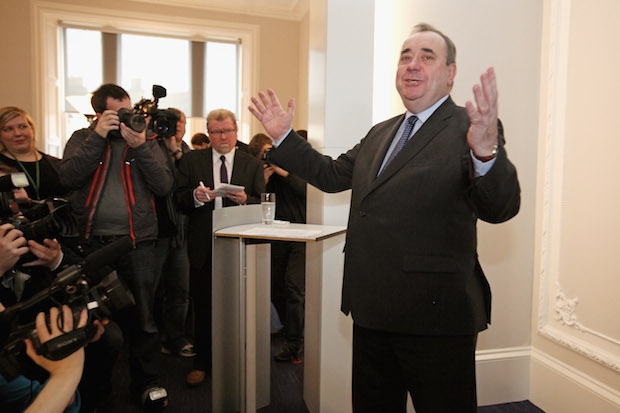All through this referendum campaign, there have been two battles: one has been in the open. This has generally been courteous and respectful. But the other battle has been hidden under the cloak of internet anonymity – and it has been vile, nasty and bigoted.
Occasionally, these campaigns have collided and when this has happened, it has all got very messy indeed. That is exactly what happened today.
Today’s tale of spin doctors, Labour activists and cyberbullying appears to be a bit of a beltway story but bear with me, it is really very important and tells us a lot about where the whole campaign is going.
First, we have to scroll back just a little way, back to Monday morning in Glasgow and Better Together’s 100-days-to-go launch.
Unionist strategists decided they would have a better chance of winning over voters if they used ‘ordinary people’ to front their campaign launch, not politicians. So, on Monday, at the Glasgow rally, we heard from mothers and students and pensioners and nurses and steelworkers, all of whom were campaigning to save the Union.
Compering the event was a young  mother from Clydebank, Clare Lally (below) who described herself as an ‘ordinary mum’. Lally is the mother of two children, one of whom has severe health problems.
mother from Clydebank, Clare Lally (below) who described herself as an ‘ordinary mum’. Lally is the mother of two children, one of whom has severe health problems.
In what was one of the most effective and moving interventions of the entire campaign, Lally said she would work night and day to protect the NHS that had saved her daughter’s life – and that meant keeping it as part of the UK.
Now, Lally is a mum from Clydebank but she is also a Labour Party activist – and quite a senior one at that. So, furious Nationalists set out to undermine her case. The First Minister’s spokesman,

Campbell Gunn: folk musician-turned-hack-turned-spin doctor
Campbell Gunn, emailed the Telegraph to point out that Lally was not an ‘ordinary mum’. Gunn said Lally was a lay member of Labour’s shadow cabinet, which is true. But Gunn also claimed that Lally was the daughter in law of former Glasgow Labour Lord Provost Pat Lally – which is not.
In response to such official promptings from the Scottish Government, the cyberbullies in the Nationalist movement went into overdrive. Lally was suddenly being derided as a liar, a quisling, a collaborator and a traitor.
Her mother was reduced to tears and Lally herself was stunned by the vitriol and the abuse being levelled at her. It was at this point that the two campaigns – the public, political one and the insidious, underground one, collided.
Aware of how it was all ballooning out of control, Alex Salmond demanded that his spokesman apologise, which he did. But, as of this afternoon, it remains to be seen whether that will be enough to keep him in his job.
For instance, should a ministerial special adviser be spreading rumours – some true and untrue – about a party activist? Is that what the taxpayer is paying for? It really does appear as if other special advisers have had to go for a lot less but, as I say, we’ll see what happens over the next few days.
However long this row bubbles away for, though, it has already become one of the touchstones of the whole independence campaign because it has exposed the murky depths of cyberspace and the antics of the so-called cybernats.
It has become clear to all that, if you strip away all the talk over Lally’s role in the Better Together rally, what you are left with is the mother of a severely disabled girl being pilloried in the most abusive terms by Nationalist bullies, just for speaking out in favour of the UK.
Not only that, but the abuse came after promptings from the First Minister’s own office.
So, for the first time, Salmond has become embroiled in the unsavoury abuse from the fringes of the Nationalist campaign – fringes he has done his utmost to disassociate himself from. No wonder he was so keen for Gunn to apologise.
This tale is intricate, it is a bit beltway but that does not mean that it is unimportant. For a start, Lally’s contribution marked the first really effective Better Together contribution to the debate for some time. But it also sparked a series of events which led to Salmond being thrust on to the defensive in the desperate hope of saving a special adviser from the axe.
Not only that, but it put the activities of those anonymous cowards who abuse others from the safety of their own basements into the spotlight for the first time.
As a result, this could actually be one of those pivotal moments in the campaign that we shall look back upon, after September 18 and only realise then quite the momentous effect that it had.






Comments